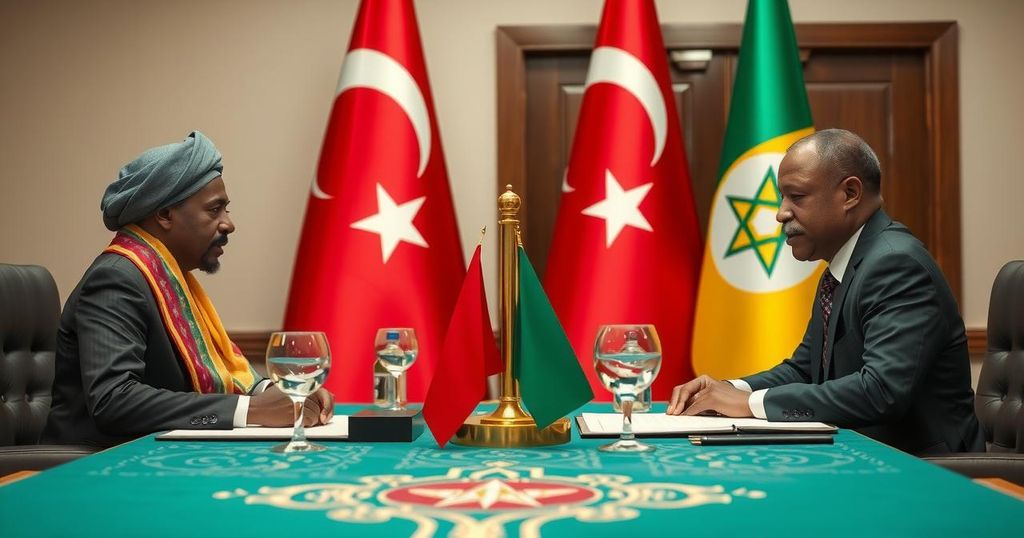Turkey to Host Key Talks between Somali and Ethiopian Leaders on Port Access

Turkey is set to host pivotal talks this week between Somali President Hassan Sheikh Mohamud and Ethiopian Prime Minister Abiy Ahmed to resolve disputes over Ethiopia’s access to ports. Somalia perceives Ethiopia’s agreement with Somaliland as a threat to its sovereignty. Turkey aims to facilitate dialogue amidst tensions and has previously established naval agreements with both countries to enhance security.
Turkey is preparing to facilitate high-level discussions this week between Somali President Hassan Sheikh Mohamud and Ethiopian Prime Minister Abiy Ahmed, aimed at addressing a protracted disagreement regarding Ethiopia’s aspirations for port access in the Horn of Africa. Reports, including those from Somali media, indicate that President Mohamud intends to engage directly with Prime Minister Ahmed during this visit. The Turkish foreign ministry has refrained from providing comments, and the Ethiopian embassy in Ankara has similarly opted against public remarks on the matter.
Earlier this year, Ethiopia entered into a naval agreement with Somaliland, which was perceived by Mogadishu as an acknowledgment of Somaliland’s self-declared independence, thus threatening Somali national sovereignty. In light of escalating tensions, Turkey established a comprehensive naval agreement with Somalia focusing on the formation of a Somali navy and safeguarding Somali waters from external threats. This agreement has also paved the way for a partnership in energy exploration, ushering in Turkish energy vessels along the Somali coastline.
Somali officials have issued warnings to Addis Ababa about the potential for conflict if the naval agreement with Somaliland proceeds. Notably, Turkey has previously hosted two rounds of discussions at the foreign ministerial level, with Turkish officials reporting that advancements had been made in negotiations earlier this year. Despite Ankara’s solid security ties with Ethiopia, following drone sales meant to bolster the government during its civil strife with Tigray forces, the relationship remains fraught with tension.
Observers in Ankara speculate that the upcoming discussions involving leaders Mohamud and Ahmed could yield favorable outcomes. It has been suggested that Somalia might consider granting Ethiopia port access near their border, contingent upon Ethiopia abandoning its naval pact with Somaliland. Complicating these negotiations are recent presidential elections in Somaliland, which have modified the political landscape, as the new president, Abdirahman Mohamed Abdullahi, is believed to be less accommodating to Prime Minister Ahmed than his predecessor. Should the talks progress positively, there is a prevailing expectation that Turkish President Recep Tayyip Erdogan may play a pivotal role in achieving a successful conclusion to the negotiations.
The diplomatic relationship between Somalia and Ethiopia has been historically complex, with recent developments threatening to escalate into conflict. Ethiopia’s naval agreement with Somaliland has been a flashpoint, leading to Somali concerns over territorial integrity. Turkey has emerged as a key player in this regional dynamics, enhancing its security and diplomatic partnership with Somalia. The current talks represent an important diplomatic effort to manage tensions and seek resolution through negotiation.
In conclusion, Turkey’s initiative to host discussions between Somali and Ethiopian leaders symbolizes a crucial effort to mediate longstanding disputes over territorial access and sovereignty issues in the Horn of Africa. The outcome of these talks could significantly impact regional stability, as both nations navigate complex political landscapes influenced by external agreements and newly elected leadership. Observers remain hopeful for potential breakthroughs that could foster cooperative relations in the region.
Original Source: www.middleeasteye.net








